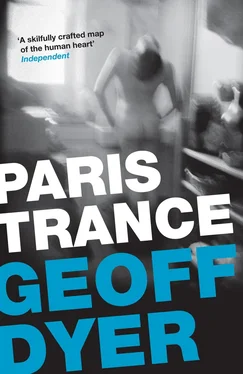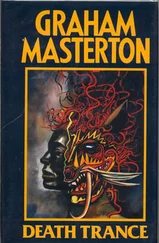Geoff Dyer - Paris Trance
Здесь есть возможность читать онлайн «Geoff Dyer - Paris Trance» весь текст электронной книги совершенно бесплатно (целиком полную версию без сокращений). В некоторых случаях можно слушать аудио, скачать через торрент в формате fb2 и присутствует краткое содержание. Год выпуска: 2014, Издательство: Canongate, Жанр: Современная проза, на английском языке. Описание произведения, (предисловие) а так же отзывы посетителей доступны на портале библиотеки ЛибКат.
- Название:Paris Trance
- Автор:
- Издательство:Canongate
- Жанр:
- Год:2014
- ISBN:нет данных
- Рейтинг книги:5 / 5. Голосов: 1
-
Избранное:Добавить в избранное
- Отзывы:
-
Ваша оценка:
- 100
- 1
- 2
- 3
- 4
- 5
Paris Trance: краткое содержание, описание и аннотация
Предлагаем к чтению аннотацию, описание, краткое содержание или предисловие (зависит от того, что написал сам автор книги «Paris Trance»). Если вы не нашли необходимую информацию о книге — напишите в комментариях, мы постараемся отыскать её.
Paris Trance — читать онлайн бесплатно полную книгу (весь текст) целиком
Ниже представлен текст книги, разбитый по страницам. Система сохранения места последней прочитанной страницы, позволяет с удобством читать онлайн бесплатно книгу «Paris Trance», без необходимости каждый раз заново искать на чём Вы остановились. Поставьте закладку, и сможете в любой момент перейти на страницу, на которой закончили чтение.
Интервал:
Закладка:
‘I suppose.’
‘And what was it going to be about?’
‘Ah, I never gave that much thought.’
‘You had no idea what it was going to be about?’
‘It was going to be about. . Well, that’s the funny thing. I suppose it would have been about the life we lead now. About you and Sahra and Nicole. About that house we stayed in over Christmas. It would have been about you and me and Nicole eating breakfast in our apartment. About our dog, Spunk. About you and I sitting on the Métro on our way to football. .’
‘Having this conversation?’
‘Yes. Reflecting on things. So to speak.’
‘And why didn’t you write it?’
‘I didn’t have the faintest idea how to. It was just an adolescent idea.’
‘There’s still time.’
‘But there’s no need,’ said Luke. ‘What’s the point? Why write something if you can live it?’
‘Because you can’t live it for ever, I suppose,’ said Alex, getting up. ‘This is our stop.’
It was only a five-minute walk from the Métro to the football pitch. They passed a homeless guy with a dog, hustling for change.
‘That’ll be you in a few years’ time,’ said Alex. ‘Sitting there with your bowl and your plastic dog.’
‘His name’s Spunk,’ Luke insisted.
They had been playing for less than ten minutes when Luke stretched to block a shot on goal. He felt his foot twist horribly, forced round by the impact of his opponent’s kick. His teammates applauded the tackle but Luke could not play on, could not put any weight on his left leg. In minutes his ankle swelled up like an orange, then a grapefruit. He felt as if his foot had been torn off. His ankle was broken, he was sure. He sat behind the goal, on the brink of tears. Then, not even waiting for the game to end, he pulled on his tracksuit and told Alex he was taking a taxi home. Alex offered to come with him (Luke was emphatically not a taxi-taker, he had obviously hurt himself badly) but Luke urged him to stay and play on. He held his leg very still in the taxi, paid and hobbled up the stairs to the apartment. Nicole was still in bed. When she opened her eyes he began crying. Swollen beyond the realm of fruit, his ankle had assumed the colour of a bad banana, the kind of banana Sahra liked. He lay on the bed. Nicole put his foot on a cushion, wrapped a pack of frozen peas in a towel and wrapped the towel round his ankle.
‘You should have done this straight away,’ she said. ‘And we should go to the hospital.’ Luke lay on the bed, lost in pain, on the brink of throwing up.
At the hospital they waited for two hours to see a doctor and then waited another hour for an X-ray. The ankle was not broken but the ligaments were torn so badly that it would be best to have it put in plaster. The doctor said this as though there was a choice. When Luke asked if there were a choice the doctor said no, not really.
It was five in the afternoon by the time they left hospital with crutches and a bottle of pain-killers. Back home they found three messages from Alex on the answering machine. Nicole was tender, loving. Luke had never loved her more: a predictable enough reaction, partly comprising self-pity, shock, helplessness; but Nicole, too, felt as if her love for him were being raised. . no, not raised, the opposite: deepened. They had tapped into some elemental current that has always existed between men and women, that causes nurses to fall in love with the crippled men they are caring for. And this did not extinguish or run counter to the sexual energy between them. Having arranged Luke comfortably on the bed she undressed and knelt over his face. She closed her eyes and began stroking her breasts, reached down and separated her lips with her fingers. She stopped after a while and walked over to the filing cabinets. When she returned she knelt over him again, facing away from him, rubbing the vibro along her cunt.
After Nicole had come she said, ‘Can you move over on to your side?’ He did so slowly, careful not to jolt his ankle. He felt the slick touch of saliva and her finger slipping inside him. Then the harder buzz and pressure of the vibrator. He had never wanted anything more. He pressed back. At first there was a sensation of extreme tightness and then he felt himself open up. She had often pushed her finger inside him but he had never felt anything like this. It was as if he were dissolving. He moved his right knee up towards his stomach and felt her move more deeply into him. She touched his prick and in seconds he was coming.
‘Now we’re quids,’ said Nicole.
‘Quits,’ he said, correcting her English for once.
For three days Luke didn’t leave the apartment. Then he began hobbling around, going to the shops for milk, to the Petit Centre for breakfast. The world had changed utterly in the interim. Now, he realized, it was peopled overwhelmingly by the halt and the lame. Everywhere he went he saw fellow limpers, hobbling and shuffling their way through the world. Infirmity was the norm. The highly mobile minority were missing out on a fundamental fact of life: getting around was difficult. It was like a premonition of being old, when even the smallest task would require planning, concentration and determination. Everything changed. Those men who levered themselves along the street in gallant, hour-long expeditions to the tabac for a Lotto card seemed less like unfortunates, more like the elders of the city, gurus in possession of the final secret of debility.
Lazare transferred Luke to what Alex termed a ‘desk job’ at the warehouse: filling in orders and manifests, checking deliveries. The lunch-time kick-arounds were starting again and Luke went along too, on his crutches, feeling sorry for himself, to watch. He was glad when the lunch break was over and they went back to work.
An outsider might have thought it strange that we stayed so long at the warehouse, working at what must have seemed a dead-end job. It was a dead-end job but everyone was happy to stay there. Several people — Matthias, Daniel — had vague plans to paint, to write, to make films (Luke’s Route 29 was a case in point), but no one showed any sign of putting these plans into practice, possibly because working at the warehouse, surrounded by other people who had no immediate plans to get on, made it easy to forget that in the world beyond the warehouse people were making plans and films, holding exhibitions and forging careers. And at the same time, because the guys at the warehouse were working — as opposed to being miserably unemployed — and because most of them were foreigners, working abroad (gastarbeiters, according to Alex), this easy-going purposelessness had an automatic element of achievement built into it. Besides, Luke insisted, it didn’t matter if they weren’t achieving anything.
‘Life is there to be wasted,’ he joked.
At her job, meanwhile, Nicole was becoming increasingly aware of the attentions of her boss, Pierre. He was approachable, polite, friendly, interested. He complimented her on her work, listened attentively to any suggestions she had about the projects that were coming through the office. He sought out her opinions and then, when they had finished discussing work-related matters, he asked her about films, books. They had lunch together (he paid). He found himself wanting to stand closer to her when they were talking in the office, drinking mugs of coffee. Pierre loved his work, was ambitious, had always looked forward to going into the office, but now what he most looked forward to was seeing what Nicole would wear to work, how she would wear her hair. He came to recognize her perfume. Sometimes she was sure she could feel his eyes on her back, the touch of his gaze. When she turned round he would be looking the other way, doing something else, but he was there, always. Nicole was efficient, reliable, friendly. She never flirted. Describing her to a friend at lunch one day Pierre said that what fascinated him about her most was her absolute chastity. What he didn’t say was that he felt — as surely as Nicole could feel his eyes on her back — her to be a woman who would give herself utterly to a man. Her chasteness was somehow the outward proof, the external manifestation, of a potential for sexual abandon all the more alluring for being hidden, invisible. This certainty — a conviction whose strength derived, paradoxically, from an apparent lack of evidence — drove him to distraction. He came to love and, almost, to hate her. He bought her a present — an expensive fountain pen — and then made light of it. On several occasions Nicole made a point of using the word ‘boyfriend’ but to Pierre this nameless boyfriend seemed just that, a boy who was not to be taken seriously, an impediment. When he heard that the boyfriend had injured his ankle this seemed less an accident than a manifestation of his physical inadequacy. The knowledge, the certainty, that Nicole’s erotic ‘potential’ — and he found himself using that word frequently when telling her about future business ventures — was still to be unleashed, caused his attitude towards her gradually to coarsen. Pierre was urbane, charming, but Nicole was becoming increasingly aware of a leer in the things he said. As she came to know him better his charm began to falter. His habitual poise only just managed to prevent his flirting and innuendoes appearing crude rather than suave, suggestive. Nicole came to dread days that ended with just the two of them alone at the office: not because she feared him but — as she told Luke — because it was becoming tiresome dealing with him.
Читать дальшеИнтервал:
Закладка:
Похожие книги на «Paris Trance»
Представляем Вашему вниманию похожие книги на «Paris Trance» списком для выбора. Мы отобрали схожую по названию и смыслу литературу в надежде предоставить читателям больше вариантов отыскать новые, интересные, ещё непрочитанные произведения.
Обсуждение, отзывы о книге «Paris Trance» и просто собственные мнения читателей. Оставьте ваши комментарии, напишите, что Вы думаете о произведении, его смысле или главных героях. Укажите что конкретно понравилось, а что нет, и почему Вы так считаете.












